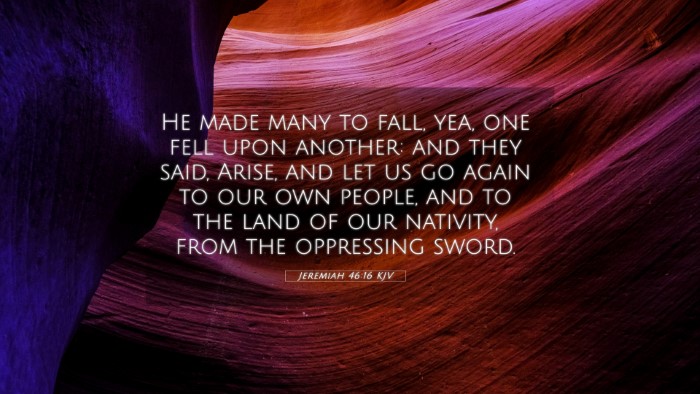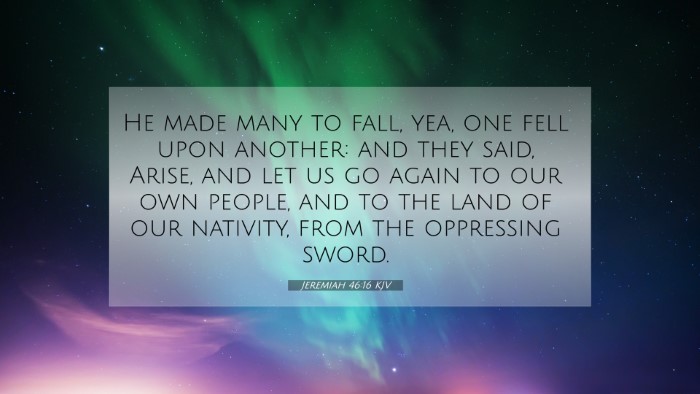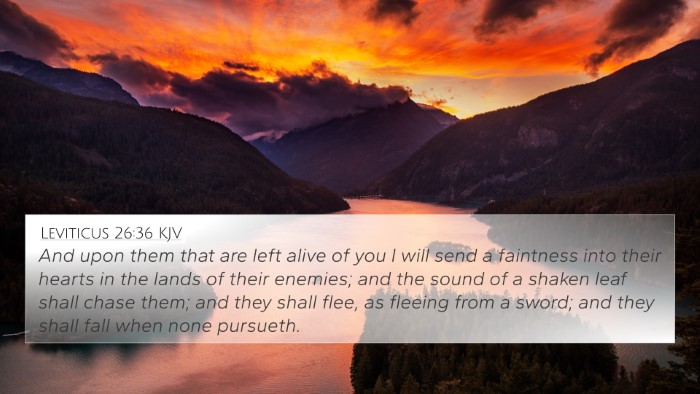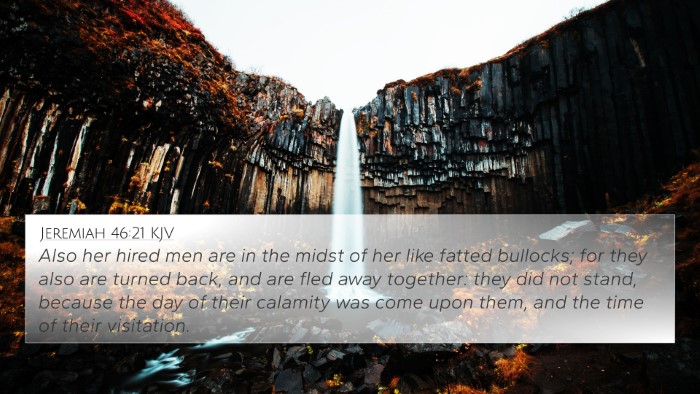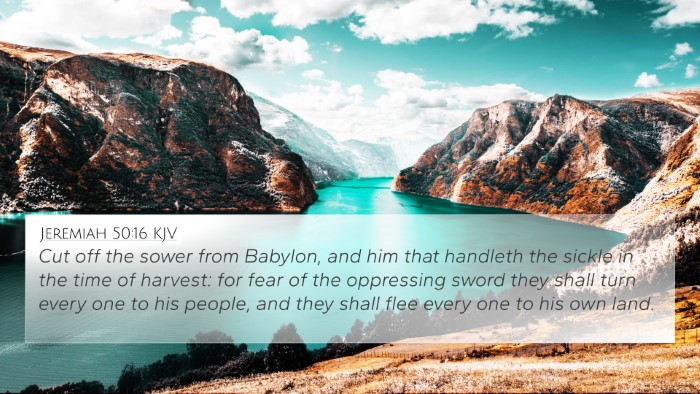Understanding Jeremiah 46:16
Jeremiah 46:16 states, "He made many to fall, yea, one fell upon another: and they said, Arise, and let us go again to our own people and to the land of our nativity from the oppressing sword." This verse captures the aftermath of a battle, where confusion and fear lead the defeated army to consider retreating back to their homeland.
Summary of Insights from Public Domain Commentaries
Matthew Henry's Commentary
Matthew Henry emphasizes the chaos of battle depicted in this verse. He notes that as the Medes and Egyptians falter, their ranks collapse under the weight of both physical defeat and psychological distress. The imagery of falling upon one another illustrates the desperation that comes when an army faces overwhelming odds.
Albert Barnes' Notes
Albert Barnes interprets this verse in the context of God's judgment on Egypt, indicating that the military struggles symbolize a deeper spiritual conflict. He highlights that fleeing back to one's homeland represents a return to the security and comfort of one's origins, which resonates with the broader theme of divine protection and return found throughout the Bible.
Adam Clarke's Commentary
Adam Clarke provides an analysis focusing on the physical and emotional implications of defeat. He remarks on the collective realization among the warriors that their efforts were futile and that survival prompted thoughts of retreat. Clarke also draws parallels between this moment and other scriptural instances where armies faced defeat, suggesting a thematic strand of divine sovereignty and human vulnerability.
Thematic Connections and Cross-References
This verse is rich in connections with other biblical passages, reflecting themes of defeat, divine judgment, and the struggle for identity in crises. Below is a list of related Bible verses:
- Jeremiah 1:14-15 - Discusses the impending judgment against the nations, including Egypt.
- Ezekiel 30:4 - Prophecies the fall of Egypt as a symbol of God's judgment.
- Isaiah 19:17 - The fear of Judah among the Egyptians signifies the perception of inevitable defeat.
- Psalm 46:6 - Describes nations in uproar, resonating with the chaos in Jeremiah 46:16.
- Proverbs 21:30 - Reminds of the futility of human plans against divine decree.
- Revelation 18:2 - Details the fall of Babylon, paralleling the collapse of nations as an act of divine judgment.
- Luke 21:25-26 - Speaks about the distress of nations, similar in theme to the fears expressed in Jeremiah.
- Deuteronomy 28:25 - Prophetic warning about the consequences of disobedience leading to military defeat.
- Isaiah 14:31 - Highlights the fear and dismay in the context of impending judgment on a nation.
- Micah 4:10 - The call to mourn and weep, echoing the themes of retreat and despair seen in Jeremiah 46:16.
Exploring the Verse's Meaning
Connections Between Bible Verses: The verse showcases the inter-biblical dialogue on the consequences of turning away from God, illustrating how various scriptures can enhance understanding. The similitudes among these verses help to illustrate a broader theological principle: God’s displeasure with nations leads to chaos, confusion, and ultimately, defeat.
Comparative Bible Verse Analysis: When we analyze Jeremiah 46:16 alongside Ezekiel 30:4, it is evident that both prophets address the imminent doom of Egypt. They highlight God’s sovereignty in orchestrating history, calling nations to recognize their status under divine authority. This thematic connection aids in a comprehensive understanding of judgment as portrayed in the Old Testament.
How to Use Bible Cross-References
For students of the Bible and for those seeking deeper insight, using a Bible cross-reference guide proves invaluable. Here are some strategies for effective cross-referencing:
- Identify keywords or themes in the verse you are studying (e.g., "defeat," "retreat," "judgment").
- Utilize tools for Bible cross-referencing, such as a Bible concordance, to compile verses that relate both contextually and thematically.
- Engage in cross-reference Bible study methods, such as thematic searches which can reveal how various passages interplay with each other.
- Document insights from comparisons to create a holistic view of the biblical themes across both Testaments.
- Consider the historical and cultural background surrounding each verse for a richer interpretation.
Conclusion
In summary, Jeremiah 46:16 encapsulates a profound moment of despair and retreat amid battle, linking to broader themes of divine judgment and the human response to crisis. By employing comparative Bible verse analysis and utilizing cross-referencing techniques, this verse can be better understood in the context of both its immediate narrative and its place within the larger biblical canon.

